|
|
|
Sort Order |
|
|
|
Items / Page
|
|
|
|
|
|
|
| Srl | Item |
| 1 |
ID:
164835
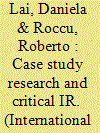

|
|
|
|
|
| Summary/Abstract |
Discussions on case study methodology in International Relations (IR) have historically been dominated by positivist and neopositivist approaches. However, these are problematic for critical IR research, pointing to the need for a non-positivist case study methodology. To address this issue, this article introduces and adapts the extended case methodology as a critical, reflexivist approach to case study research, whereby the case is constructed through a dynamic interaction with theory, rather than selected, and knowledge is produced through extensions rather than generalisation. Insofar as it seeks to study the world in complex and non-linear terms, take context and positionality seriously, and generate explicitly political and emancipatory knowledge, the extended case methodology is consistent with the ontological and epistemological commitments of several critical IR approaches. Its potential is illustrated in the final part of the article with reference to researching the socioeconomic dimension of transitional justice in Bosnia and Herzegovina.
|
|
|
|
|
|
|
|
|
|
|
|
|
|
|
|
| 2 |
ID:
116178
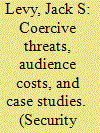

|
|
|
| 3 |
ID:
153628
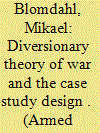

|
|
|
|
|
| Summary/Abstract |
This article examines President Clinton’s decisions to launch military actions against Iraq in June 1993 and Kosovo in 1999. This study represents an attempt to test the descriptive accuracy and further developing the diversionary theory of war. Using a qualitative framework for diversionary use of force developed by another researcher, Ryan C. Hendrickson, this research examines and compares the two cases in order to determine whether or not these strikes appear to be diversionary in nature. This article generally suggests that empirical support for the diversionary argument in these cases is “mixed” but has more validity in the actions against Iraq. Two proposals to further develop qualitative tests for diversionary use of force are advanced.
|
|
|
|
|
|
|
|
|
|
|
|
|
|
|
|
| 4 |
ID:
097846
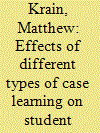

|
|
|
|
|
| Publication |
2010.
|
| Summary/Abstract |
Two types of case learning-case studies and problem-based learning-have become staples in our active learning international relations classrooms. Yet few teacher-scholars have examined whether different types of case learning yield different learning outcomes. This study examines the student engagement in response to four different types of case learning: case studies with texts designed for the case method, those using written nontraditional case materials, those incorporating documentary films as case materials, and problem-based learning approaches. I survey students in two International Political Economy classes as a way of yielding an indirect assessment of how effective or useful these different approaches are, and which types of case learning engaged students most. Results suggest that the types of case learning that engaged students' senses in multiple ways-problem-based learning and case studies using films as texts-enhanced their perceptions of the exercises' effectiveness. Case studies that relied on written texts alone were not rated as highly, although were still seen as extremely valuable. These results are consistent with the findings from the cognitive psychology literature that informs the active teaching and learning approach.
|
|
|
|
|
|
|
|
|
|
|
|
|
|
|
|
| 5 |
ID:
153076


|
|
|
|
|
| Summary/Abstract |
Since the 9/11 attacks critics of the American intelligence community have often complained about the lack of scientific rigor in intelligence analysis, and much of the work of the intelligence community has been described as mere ‘analysis by anecdote.’ In response, the intelligence community has made a considerable effort to increase the rigor of its analysis. But surprisingly little has been done to examine how intelligence professionals might benefit from adopting one of the most common methods used in the social sciences: case study analysis. This article argues that a greater understanding of how case studies are used by political scientists and other scholars can help improve the quality of intelligence analysis and help the intelligence community assist policymakers as they attempt to understand the threats and challenges of today’s world.
|
|
|
|
|
|
|
|
|
|
|
|
|
|
|
|
| 6 |
ID:
168317
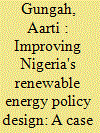

|
|
|
|
|
| Summary/Abstract |
Nigeria has embarked on various programmes and policies in trying to make its energy system efficient. Renewable energy (RE) is one at the heart of this reformation. However, the country's energy reforms within the ambit of RE suffer setbacks, owing to poorly utilized RE resources and initiation of relevant policies. Consequently, these setbacks widen the gap between energy demand and supply. This has motivated the need to appraise the effectiveness, efficiency, equity and institutional feasibility of Nigeria's RE legal and policy framework. The study adds to literature by adopting a case study approach to initiate improvement of the effectiveness and efficiency of the Nigerian RE legal and policy framework. Our results disclose an urgent need to drive a coordinated and consistent legal intervention, specific and time-bound targets, political commitment, policy choice and design, funded research and development activities, social awareness and public engagement, in order to improve RE development and deployment in Nigeria. Additionally, enacting well-conceived RE laws in Nigeria and building relevant institutions, were identified to be crucial in achieving expansive and sustainable RE development for the country.
|
|
|
|
|
|
|
|
|
|
|
|
|
|
|
|
| 7 |
ID:
099001
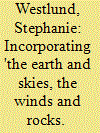

|
|
|
|
|
| Publication |
2010.
|
| Summary/Abstract |
Scholars often re-tell and analyze peacebuilding stories as independent of locale, as though place does not matter. Inspired by a Mayan priest's observation that academic peacebuilding frameworks are missing 'the earth and skies, the winds and rocks', this article examines the role of nature in conflict transformation and peacebuilding. It reviews the results of studies highlighting nature's function in human evolution and in improving mental health and well-being. It then presents three case studies of peacebuilding processes in which participants interacted with one another in natural settings. When these cases are taken at the convergence of the empirical research on nature's emotional and physiological benefits to human beings, a meaningful pattern emerges. Each case becomes understood as tied to the ecologies of the place where participants engaged with one another, thus suggesting that nature is an active yet overlooked participant in conflict transformation and peacebuilding.
|
|
|
|
|
|
|
|
|
|
|
|
|
|
|
|
| 8 |
ID:
193479
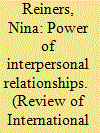

|
|
|
|
|
| Summary/Abstract |
This article further develops and illustrates the argument that relationships between individuals help to explain the success of human rights advocacy in international institutions. Drawing from advocacy theory and socio-legal studies, I shift the attention from collective forms of advocacy to the importance of interpersonal relationships of advocates with individuals in international institutions to influence the development of human rights. I introduce a framework consisting of three analytical steps – mapping the key actors in a network, process-tracing, and biographical research – and apply the framework to three cases of norm development by a United Nations human rights treaty body. My findings highlight the power of interpersonal relationships for the making of human rights, and they inform scholarship on transnational elites, human rights advocacy, and the politics of international law.
|
|
|
|
|
|
|
|
|
|
|
|
|
|
|
|
| 9 |
ID:
151001
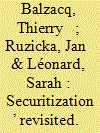

|
|
|
|
|
| Summary/Abstract |
Securitization theory seeks to explain the politics through which (1) the security character of public problems is established, (2) the social commitments resulting from the collective acceptance that a phenomenon is a threat are fixed and (3) the possibility of a particular policy is created. In the last decade, research on securitization has grown significantly. The aim of this article is to evaluate the achievements of securitization theory. First, its main concepts and premises are critically discussed. This article then proceeds to examine the empirical applications of securitization theory to a broad range of issues, as well as the theoretical implications of these studies. Finally, it discusses the main challenges faced by securitization scholars and puts forward strategies to overcome them. This article develops three inter-related arguments. First, notably thanks to empirical studies, securitization theory has significantly developed beyond its initial focus on the speech act. Second, as a result, the distinctiveness of securitization theory currently lies in its capacity to articulate a specific approach to security – influenced by the speech act – with an ‘analytics of government’, which emphasizes practices and processes. Third, securitization theory faces three types of challenges, related, respectively, to theory, method and methodology. The capacity of scholars to overcome those will strongly influence the extent to which securitization theory will be able to make significant contributions to the debates in Security Studies and International Relations in the years to come.
|
|
|
|
|
|
|
|
|
|
|
|
|
|
|
|
| 10 |
ID:
175837


|
|
|
|
|
| Publication |
New Delhi, Lancer, 2019.
|
| Description |
xxiii, 188p.
|
| Standard Number |
9788170623236
|
|
|
|
|
|
|
|
|
|
|
|
Copies: C:1/I:0,R:0,Q:0
Circulation
| Accession# | Call# | Current Location | Status | Policy | Location |
| 059925 | 355.0218/KAT 059925 | Main | On Shelf | General | |
|
|
|
|
| 11 |
ID:
165318


|
|
|
|
|
| Summary/Abstract |
When leaders negotiate face-to-face, why would an expression of anger make an interlocutor yield to one’s demand in some instances but cause him to become more intransigent in others? In this article, I consult recent findings in social and experimental psychology and provide an explanation for when anger is more likely to be considered a credible expression of resolve. Anger elicits concessions if a leader has projected an image for being composed most of the time. On the contrary, expressing anger makes an interlocutor more unyielding if a leader is known for becoming angry easily and frequently. I demonstrate such contrasting preconceptions of a leader’s temperament—a “stoic” versus a “hothead”—and their impact on the larger trajectory of international politics with two in-depth case studies on the face-to-face interactions between Khrushchev, Macmillan, and Eisenhower from the onset of the Berlin Crisis in November 1958 to the aborted four-power summit in Paris two years later.
|
|
|
|
|
|
|
|
|
|
|
|
|
|
|
|
| 12 |
ID:
168796


|
|
|
|
|
| Summary/Abstract |
How does forced migration affect the politics of host states and, in particular, how does it impact states’ foreign policy decision-making? The relevant literature on refugee politics has yet to fully explore how forced migration affects host states’ behavior. One possibility is that they will employ their position in order to extract revenue from other state or nonstate actors for maintaining refugee groups within their borders. This article explores the workings of these refugee rentier states, namely states seeking to leverage their position as host states of displaced communities for material gain. It focuses on the Syrian refugee crisis, examining the foreign policy responses of three major host states—Jordan, Lebanon, and Turkey. While all three engaged in post-2011 refugee rent-seeking behavior, Jordan and Lebanon deployed a back-scratching strategy based on bargains, while Turkey deployed a blackmailing strategy based on threats. Drawing upon primary sources in English and Arabic, the article inductively examines the choice of strategy and argues that it depended on the size of the host state's refugee community and domestic elites’ perception of their geostrategic importance vis-à-vis the target. The article concludes with a discussion of these findings’ significance for understanding the international dimension of the Syrian refugee crisis and argues that they also pave the way for future research on the effects of forced displacement on host states’ political development.
|
|
|
|
|
|
|
|
|
|
|
|
|
|
|
|
| 13 |
ID:
185996
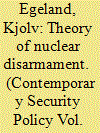

|
|
|
|
|
| Summary/Abstract |
What might prompt a nuclear-armed state to give up its arsenal? Nuclear disarmament has provided a nominally shared goal for virtually all the world’s states for decades, yet surprisingly little effort has been devoted to systematically theorizing its drivers. This article aims to begin filling this void. I proceed in three steps. First, I discuss the conceptual, material, and ideational features of renunciation to arrive at a rudimentary understanding of what, fundamentally, nuclear disarmament as a political process involves. Second, I scope out the empirical evidence on which a general theory of nuclear renunciation might be based. Third, synthesizing the dominant explanations for the cases discussed in the second part, I outline a basic account of nuclear relinquishment and discuss the compatibility of this account with common assumptions about disarmament practice. I conclude that the best evidence available suggests that adversarial politics and stigmatization are necessary conditions for renunciation.
|
|
|
|
|
|
|
|
|
|
|
|
|
|
|
|
|
|
|
|
|